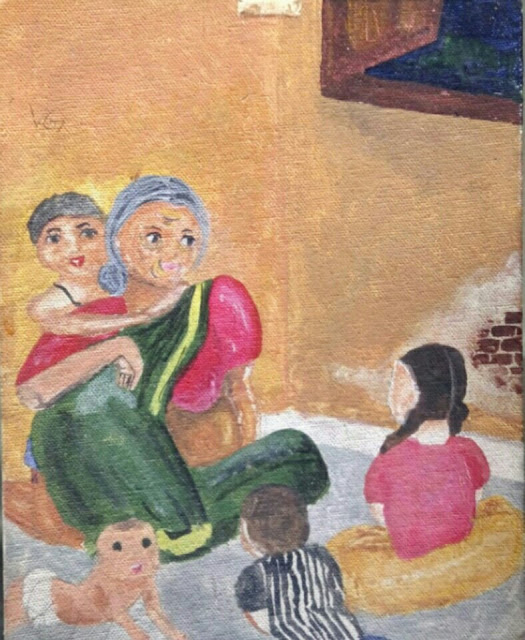Our World is Slowly Losing it's Storytellers
Our world is slowly losing its storytellers. There I said it.
Recently, somebody gave me a compliment. We were atop a hill looking over the night lights of State College, cooped up in a dark car. I was telling my friends the story of how some men tried to scare us from outside the window of the ground floor PG I lived in when I was in college, and the night we discovered them trying to violently shake the window open to possibly come in. The events could evidently be summed up in two lines, but I took my time fleshing out the details and building up the dialogue. When the based-on-true-events story was done, I went on to narrate a made-up story about a small child's encounter with a witch in her neighborhood. At the end of it, somebody told me that I was a good storyteller. They went on to elaborate the specifics of why they thought so, and I was truly flattered.
Then I had the shattering realization that I only had two stories in my jhuli. I would make a terrible thakuma.
When I was younger, I had two kinds of storytellers. One came in the forms of grandmothers (or grandmother-figures). My paternal grandmother and her best friend were particularly fond of telling me stories of divine intervention. They started out in some small locality in Bangladesh and ended with them having a heart-to-heart with Lord Shiva himself. There was Tolkien-level worldbuilding involved, with characters going from magical versions of the Himalayas to obscure islands in the Indian ocean, and somehow ended in cloudy heavens where the Hindu Gods had round table conferences like corporation boardrooms. The second form of storytellers came in the form of caretakers in my home. They were usually young girls from villages in West Bengal, and they always had tales to tell about their life before the big, bad city. They did not seem to have memories of homework, ma'ams or exams. Instead, they shared with me how they once almost got kidnapped by chheledhora, how their mother first saw a tiger in their Sundarban home and wanted to run away, their best friend's marriage interview, or tragic village uproars that ended in someone's death. I did not need to read Malgudi Days. I had Midnapore Days, Sundarban Days and Birbhum Days. There was one occasion when both forms of storytellers became combined. It was when a nurse was hired to look after my grandma and she claimed she had divine powers and was possessed by Goddess Kali sometimes. She had many stories, but for me, she also became a story.
I write a lot of stories just because I like to. But can I tell them at the drop of a hat like my childhood storytellers could? I don't think so.
Before there was Game of Thrones, for thousands of years, there was the oral tradition of storytelling. Ancient myths and epics are essentially the results of stories being passed down from generation to generation until someone decided to write them down. In the distant past, women helped each other by sharing their stories away from the eyes and ears of men. Cautionary tales were disguised as fairy tales. There were some stories that everybody in a village knew, and they were united by that before written history tied us together with the thread of common heritage. Eventually, though, stories could be written, printed and copied, and the tradition of storytelling changed.
It didn't change too much, though. Up until the last generation, grandmas telling stories to children was a common fixture in every household. Sometimes, granddads pitched in too, with stories of what happened during the war/partition/independence movement. My grandfather actually wrote a Bangla book about his childhood, every chapter rich with details. Even though I can't be sure yet, I don't think my parents will tell stories to my niece the way my grandparents told to me. Honestly, I fear I won't be able to tell any at all.
What is happening to our imaginations? No, really.
Well, I am no expert on this cultural shift, but my theory is that with TV and internet, we are constantly in a state of absorbing information thrown at us. For stories to grow, you need to be a creator in your own world for a while, but every time we get distracted by TV or social media, that brain space gets taken up by whichever plot is currently making waves, and our own stories get buried too deep within our own minds. But how happy am I that I will be passing down George R.R. Martin's stories to my grandkids and not my own? I mean I will obviously take out the parts where Daenarys takes off her clothes, but still. It's not that I'm choosing not to be the thaakuma with the jhuli. I don't freaking have a jhuli! I barely have a tiny story wallet as thin as my actual wallet!
The problem is that I think it's not just me. I think we are losing the oral tradition of storytelling in general but not noticing it. We have so much to give our future generations in the materialistic sense, but one by one, we might be losing the social and emotional tools that helped families bond. Now it's up to us whether we care about this as much as the most recent viral social justice issue. Just saying.


Comments
Post a Comment